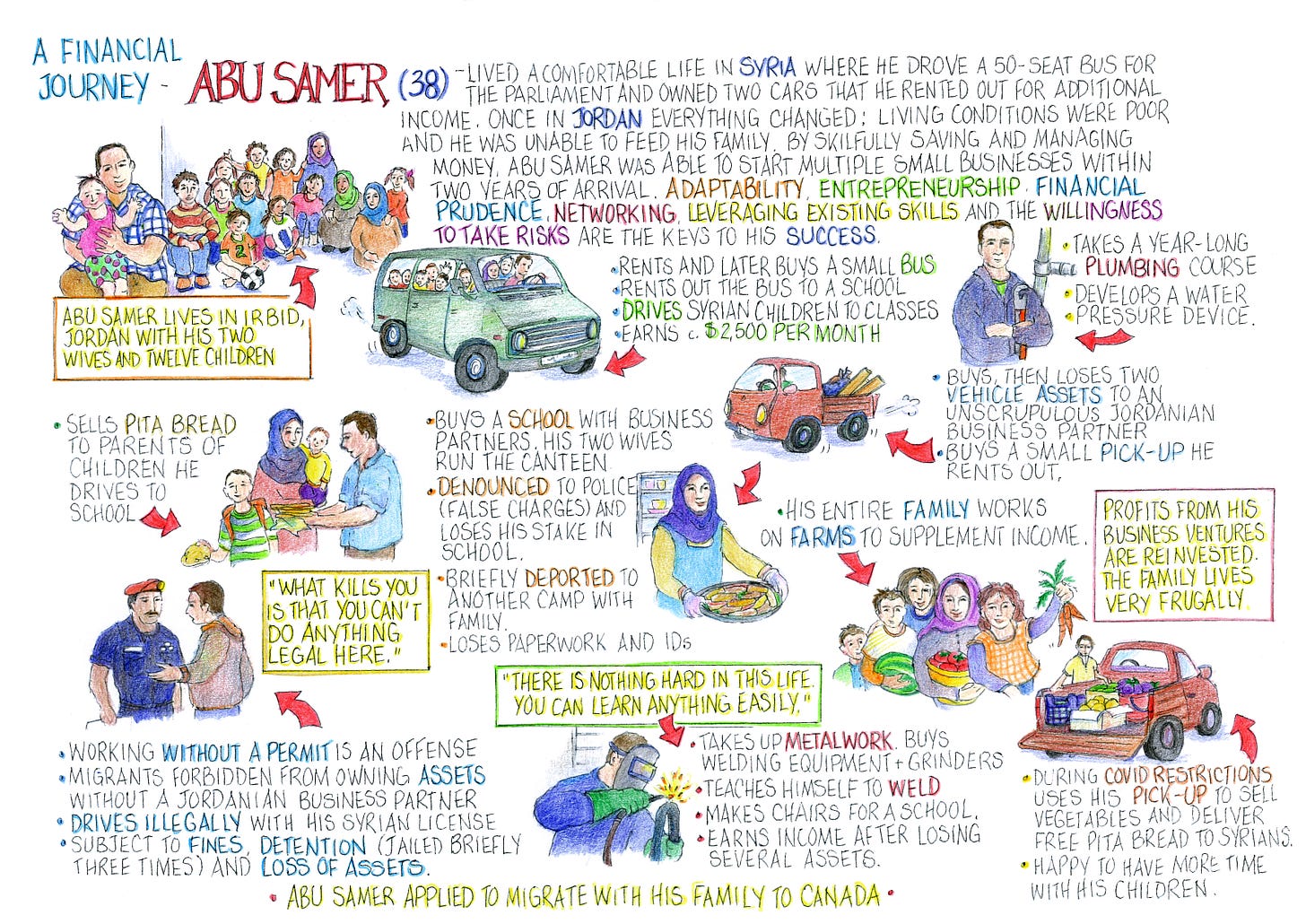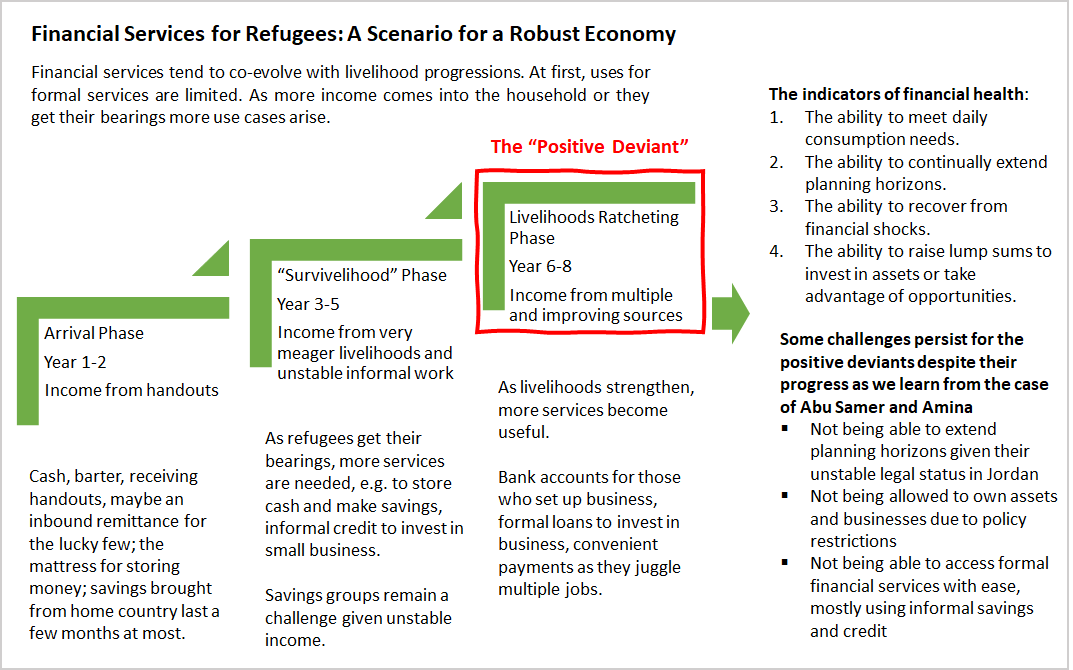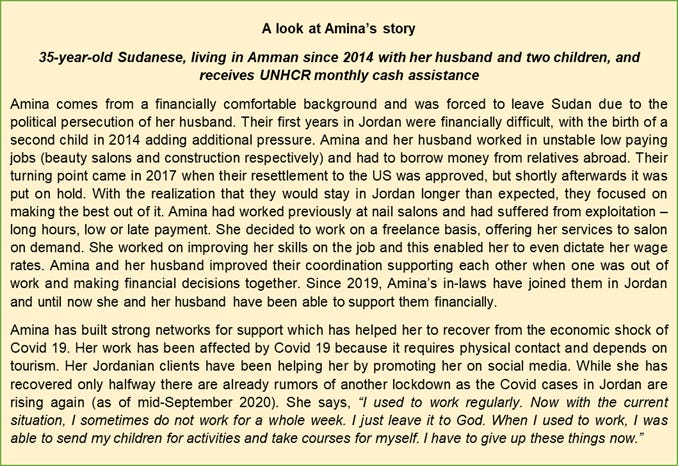Entrepreneurship Amidst Displacement
In this issue of Fresh FINDings we feature research from Jordan, led by Swati Mehta Dhawan of Katholische Universität Eichstätt – Ingolstadt . The study focuses on how refugees and migrants manage their finances in new surroundings. Please visit the Journeys Project at Tufts University for more information on previous studies, ongoing research, videos, maps, and artwork on refugees and migrants in the Middle East, Africa, and North and South America.
Entrepreneurship Amidst Displacement
Why some respondents adjust better than others
By Swati Mehta Dhawan and Dr. Hans-Martin Zademach
Abu Samer (38) is a Syrian refugee who lives with his family of fifteen in Irbid, a northern governorate which hosts nearly 20 percent of refugees in Jordan. He has two wives and twelve children who range from 9 months to 15 years old (see picture below). One would expect this household to struggle making ends meet but on the contrary, it has managed to establish multiple sources of income from different profitable businesses. Abu Samer owns a small bus which he rents out to a school. He also drives it to transport Syrian children to and from school. This bus generates 1,600 JDs per month (about $2,256. or €1,905). Abu Samer owns another pick-up van which he rents out, earning around 300 JDs per month. He is one of few respondents “ratcheting upwards” (progressing step by step) in their livelihood journeys.
Abu Samer has been extremely entrepreneurial with his resources. When we met with him during the second interview, he said that things had been improving for him before the COVID-19 virus outbreak resulted in a strict, two-month lockdown. At the time, he had just finished paying off the last installment on his van loan and was selling pita bread to the families of the Syrian school children he was driving to school. He was making only 5 piasters of profit per pita, but could earn around 10 JDs a day without much extra effort. Lockdown severely affected his income. He did not receive rent payments for the bus or the pickup van and only had 400 JDs left, which he had set aside for that month’s expenses. He did not have much savings as he just finished paying off the van. He decided to start selling vegetables using his pickup, making a profit of around 50 JDs a day. He knew that he risked being arrested since he works without a permit, and the police in Irbid are notorious for their crackdowns on this type of infraction. Abu Samer is one of the few respondents comfortable during the lockdown and emphasized how happy he is to have spent so much time with his children.
We would certainly want to see more refugees in Jordan experience the kind of ratcheting up we see with Abu Samer. He received humanitarian cash transfers during his first years in Jordan in food coupons and rent assistance (for 18 months). This was not enough to help create cash savings but was enough to help him build assets which could earn him income. However, anyone with knowledge of Jordanian law would have already noticed the informality of Abu Samer’s business. As a refugee, he is not allowed to own assets without a Jordanian partner. His bus is registered in the name of the school that he works with. In the past he was deceived by his Jordanian partner and was reported to the police for working informally, which not only cost him his bus but also his home; he was deported to Al-Azraq camp with his family. Luckily, due to his connections in the police department, Abu Samer and his family were able to leave the camp shortly after arriving.

“Abu Samer” by Anne E. Moses
In this issue of Fresh FINDings, we will explore the financial journey of “positive deviants” or those “whose uncommon behavior and strategies enable them to find better solutions to the same problems facing their peers” (Herrington & Fliert, 2017). Nineteen of the 89 respondents interviewed were experiencing progress in varying degrees. Yet, for most this progress remains vulnerable to shocks. We examine which factors promote resilience and allow for livelihood progress and which enable precarity and livelihood retreat.

As refugees move upwards in their livelihood journeys, the need for financial services co-evolves.
What’s working for Abu Samer and others who ratchet up?
Expanding networks beyond the refugee community
A key factor that contributes to positive deviance is a respondent’s ability to leverage social networks outside of their own community – a phenomenon known as “bridging capital”. [1] This kind of capital is built through close relations to Jordanians (as colleagues, neighbors or business partners) or reliable connections to international and local organizations as well as Western expatriates that can serve as a source of funding or stepping stone to better job opportunities. NGOs have provided lucrative work for respondents. We can see this in Mohammad, a Somali refugee who earned an engineering degree from a Jordanian University through a scholarship. He is now able to capitalize on his advanced English skills as a freelance translator with an international organization. This allows him to make enough money in two or three days of work to last him for months.
“You will always access jobs through your network. It was easier after my first job since I could widen my network. The more you go out of your circle, the more you get to know more people. And that will help you out – not with money but with access and with social and phycological support.”
Abu Samer was always able to finance his business assets through the support of his Jordanian connections. Those connections also made it easy for him to find business partners. His customers, on the other hand, were Syrian. This brings us to the next enabler.
Strengthening networks within the community
This is a key enabler, especially, among non-Syrian refugee groups (notably Sudanese, Somali and partially the Yemeni refugee communities). Compared to Syrians, these populations are smaller and receive little organizational support. This makes it imperative for them to build strong networks within their community – what we call “bonding capital”.[2] Young single men (who make up a great part of these populations) share housing and living costs, enabling them to live in more central locations of Amman on a rather low budget. Education and work opportunities are circulated among them. For example, Hussein, a young Sudanese man, became aware of a scholarship-funded course at a Jordanian university through word of mouth. The course boosted his self-confidence, social networks, as well as his financial situation thanks to a generous stipend. Living in shared housing allowed him to divide household chores and gave him more time to focus on his studies and attend English classes.
Leveraging previous skills or building new ones
Hussein was able to focus on building his skills during his time in Jordan and put these skills to use by obtaining work through the new networks he had built. English language skills are specifically relevant in this case, as it widens the opportunity to work with local NGOs, international organizations, and Jordanian companies. Abu Samer managed to find opportunities in the area where he had previous experience (transportation). This allowed him to take risks as he knew how the business functioned. We see similar experiences with other respondents who used their work experience or education from their home country, or the skills gained by attending courses offered by NGOs, or self-taught knowledge developed in Jordan (e.g. beauty care where many women work), or gained language skills to become interpreters. English is particularly relevant in these cases (also Arabic in case of Somalis or even the Jordanian dialect of Arabic for Sudanese).
Adapting to displacement
Abu Samer said that after two or three years in Jordan (as his income started to increase) he decided to stop following the news from Syria and even “forgot that there was a country called Syria”. We heard similar stories from other respondents, notably Amina, a 35-year-old Sudanese woman (see box below). Amina told us that her situation improved after she accepted that she would be staying in Jordan for longer than she had imagined. She was working at a nail salon where she developed needed skills. Over time, she saw how she could improve her skills on the job. But she suffered from exploitation at work – low wages, long hours, delayed payments, and racial discrimination. She decided to work as a freelancer and now dictates her rates to clients. Even socially, in a bid to improve relations with her host population, Amina, her husband, and their two children chose to live in a traditionally Jordanian neighborhood (with low-income Jordanians and migrants), which is rare among non-Syrian respondents. She has adapted her Arabic dialect to Jordanian, helping her expand her local networks and gain more acceptance among Jordanians. Her clients are mostly Jordanian and after the Covid lockdown, in an effort to help her, they promoted Amina on social media. When we last met her, her work had started to pick up, although demand is much lower than it was before Covid.

Exhibiting entrepreneurship and risk-taking ability
We see inherent business acumen and the willingness to take risks in Abu Samer and Amina. Most of the more successful respondents have started businesses or have taken freelance work in order to avoid the challenges of obtaining a work permit or negative experiences with employers. Working on a freelance basis allows them to work on their own terms, sometimes at higher rates, with less risk of exploitation. It also allows them to work in sectors of their choosing rather than “open sectors” such as construction and agriculture. One respondent works full time from home playing online video games where he earns assets (in the games) by completing certain levels of competence and then sells those assets to other online players. However, he and other freelancers and entrepreneurs do carry the burden of securing enough business to make a living. Courage and self-confidence drive their ability to take on the risks of being self-employed in a new country. Some respondents face a double risk: the risk of starting a new business in normal conditions and the risks associated with being refugees. For instance, Abu Samer regularly drives without a Jordanian driving license and was once even stopped and fined. He continues to drive illegally. He reasons that his driving generates a relatively high income which trades off for the penalties of being caught, all in service of providing for his family. He would certainly like to do this legally, but his Syrian license is not accepted in Jordan.
Financial prudence and planning as a family
Amina and her husband learned early on that they must support each other when one of them is not working. They work together to prioritize expenses and divide financial responsibilities. Abu Samer is particularly diligent in how he divides his income into different buckets. He assigns income from certain sources to business investments and others to expenses (distinguishing again between household and business expenses). He is prudent with expenses and invests any savings back into his businesses. When we visited him, his house appeared too sparse to match the income he described – he only had basic furnishings and mattresses on the floor. Clearly, such spartan living was part of the family’s larger financial strategy. His family members also collaborated to bring income in from different sources such as working on a farm during summer, both wives are furthering their education and attended courses offered by NGOs in order to earn a transportation allowance, all the while investing in and running a canteen at a local school.
Challenges: The bed is not all roses for Abu Samer and Amina
While these “positive deviants” manage to ratchet upwards, they still face challenges and are prone to external shocks. Looking at their financial journeys, the trajectories of their financial progress are never linear with a continuous ratcheting up, and remain highly volatile. There are always slumps in their financial well being along the way at frequent intervals as they face financial shocks due to their precarious legal situation, unstable work contracts, or most recently the Covid 19 pandemic. Hence, even though they feel comfortable with the life they have built in Jordan, they do not feel financially stable. Abu Samer, for example, is not able to own assets (such as the school or vehicles he has invested in) under his name. He has previously had issues with Jordanian partners and suffered losses. He stated clearly that he does not want to invest further in the country unless he has legal rights and is in the process of migrating to Canada (though this has been put on hold due to Covid).
Refugees with higher education levels are not allowed to work in professions relevant to their qualifications (e.g. as engineers or journalists). Often, they work without proper contracts or work as volunteers or consultants on a project-by-project basis. While some might earn a decent income (400-800 JDs per month), their employment lasts as long as project funding lasts. Many respondents work for some months with an NGO and find themselves out of work for some months.
Non-Syrian refugees such as Amina, on the other hand, almost always work illegally; obtaining a work permit is prohibitively expensive (1,500-2,000 JDs) and unlike Syrians they do not enjoy any waivers on permit fees. However, they have no choice but to work to support themselves and end up working in exploitative conditions and risk detention by police. Amina herself was arrested in 2018 and her husband had to bail her out.
Despite all these challenges, these respondents remain determined to be successful. As they move forward on the pathway to self-reliance they are certainly met with many roadblocks, yet household unity, strong networks, investment in assets, and an entrepreneurial spirit tilt the odds in their favor.
[1] Bridging social capital is a type of social capital that describes networks linking people across different societal divisions such as race, class, religion, i.e. between heterogenous groups of people. During the research we observed the role of connections between refugees of different nationalities, e.g. Syrians and Jordanians or Yemeni and Egyptians or Somali and Yemeni (Putman, 2000).
[2] Bonding social capital describes networks between people of the same group or community (same social class, race, religion, etc.). In this case it refers to connections between refugees from the same nationality e.g. within Syrians or within Sudanese (Putman, 2000).
Works Cited
Herrington, M., & Fliert, E. (2017). Positive Deviance in Theory and Practice: A Conceptual Review. Deviant Behaviour.
Putman, R. D. (2000). Bowling Alone: The Collapse and Revival of American Community. New York: Simon and Schuster.
Fresh FINDings is made possible through a partnership among Tufts University, the Katholische Universität Eichstätt – Ingolstadt (Catholic University or KU), the International Rescue Committee and GIZ. Fresh FINDings also features work sponsored by Catholic Relief Services, Mercy Corps, and the International Organization for Migration.
Contact: Kimberley.Wilson@tufts.edu

